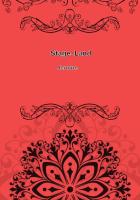298. "Malzac died at the beginning of 1694," citing Jung, p. 91.
Now on p. 91 M. Jung writes, "At the beginning of 1694 Saint-Mars had six prisoners, of whom one Melzac, dies." But M. Jung (pp.
269, 270) later writes, "It is probable that Melzac died at the end of 1692, or early in 1693," and he gives his reasons, which are convincing. M. Funck-Brentano must have overlooked M. Jung's change of opinion between his p. 91 and his pp. 269, 270.
Mattioli, certainly, had a valet in December, 1693, at Pignerol.
He went to Sainte-Marguerite in March, 1694. In April, 1694, a prisoner with a valet died at Sainte-Marguerite. In January, 1696, no prisoner at Sainte-Marguerite had a valet. Therefore, there is a strong presumption that the "prisonnier au valet" who died in April, was Mattioli.
After December, 1693, when he was still at Pignerol, the name of Mattioli, freely used before, never occurs in the correspondence.
But we still often hear of "l'ancien prisonnier," "the old prisoner." He was, on the face of it, Dauger, by far the oldest prisoner. In 1688, Saint-Mars, having only one prisoner (Dauger), calls him merely "my prisoner. In 1691, when Saint-Mars had several prisoners, Barbezieux styles Dauger "your prisoner of twenty years' standing." When, in 1696-1698, Saint-Mars mentions "mon ancien prisonnier," "my prisoner of long standing," he obviously means Dauger, not Mattioli--above all, if Mattioli died in 1694. M. Funck-Brentano argues that "mon ancien prisonnier" can only mean "my erstwhile prisoner, he who was lost and is restored to me"--that is, Mattioli. This is not the view of M. Jung, or M.
Lair, or M. Loiseleur.
Friends of Mattioli's claims rest much on this letter of Barbezieux to Saint-Mars (November 17, 1697): "You have only to watch over the security of all your prisoners, without ever explaining to anyone what it is that your prisoner of long standing did." That secret, it is argued, MUST apply to Mattioli. But all the world knew what Mattioli had done! Nobody knew, and nobody knows, what Eustache Dauger had done. It was one of the arcana imperii. It is the secret enforced ever since Dauger's arrest in 1669. Saint-Mars (1669) was not to ask. Louis XIV. could only lighten the captivity of Fouquet (1678) if his valet, La Riviere, did not know what Dauger had done. La Riviere (apparently a harmless man) lived and died in confinement, the sole reason being that he might perhaps know what Dauger had done. Consequently there is the strongest presumption that the "ancien prisonnier" of 1697 is Dauger, and that "what he had done" (which Saint-Mars must tell to no one) was what Dauger did, not what Mattioli did. All Europe knew what Mattioli had done; his whole story had been published to the world in 1682 and 1687.
On July 19, 1698, Barbezieux bade Saint-Mars come to assume the command of the Bastille. He is to bring his "old prisoner," whom not a soul is to see. Saint-Mars therefore brought his man MASKED, exactly as another prisoner was carried masked from Provence to the Bastille in 1695. M. Funck-Brentano argues that Saint-Mars was now quite fond of his old Mattioli, so noble, so learned.
At last, on September 18, 1698, Saint-Mars lodged his "old prisoner" in the Bastille, "an old prisoner whom he had at Pignerol," says the journal of du Junca, Lieutenant of the Bastille. His food, we saw, was brought him by Rosarges alone, the "Major," a gentleman who had always been with Saint-Mars. Argues M. Funck-Brentano, all this proves that the captive was a gentleman, not a valet. Why? First, because the Bastille, under Louis XIV., was "une prison de distinction." Yet M. Funck-Brentano tells us that in Mazarin's time "valets mixed up with royal plots" were kept in the Bastille. Again, in 1701, in this "noble prison," the Mask was turned out of his room to make place for a female fortune-teller, and was obliged to chum with a profligate valet of nineteen, and a "beggarly" bad patriot, who "blamed the conduct of France, and approved that of other nations, especially the Dutch."
M. Funck-Brentano himself publishes these facts (1898), in part published earlier (1890) by M. Lair.[1] Not much noblesse here!
Next, if Rosarges, a gentleman, served the Mask, Saint-Mars alone (1669) carried his food to the valet, Dauger. So the service of Rosarges does not ennoble the Mask and differentiate him from Dauger, who was even more nobly served, by Saint-Mars.
[1] Legendes de la Bastille, pp. 86-89. Citing du Junca's Journal, April 30, 1701.
On November 19, 1703, the Mask died suddenly (still in his velvet mask), and was buried on the 20th. The parish register of the church names him "Marchialy" or "Marchioly," one may read it either way; du Junca, Lieutenant of the Bastille, in his contemporary journal, calls him "M. de Marchiel." Now, Saint-Mars often spells Mattioli, "Marthioly."
This is the one strength of the argument for Mattioli's claims to the Mask. M. Lair replies, "Saint-Mars had a mania for burying prisoners under fancy names," and gives examples. One is only a gardener, Francois Eliard (1701), concerning whom it is expressly said that, as he is a prisoner, his real name is not to be given, so he is registered as Pierre Maret (others read Navet, "Peter Turnip"). If Saint-Mars, looking about for a false name for Dauger's burial register, hit on Marsilly (the name of Dauger's old master), that MIGHT be miswritten Marchialy. However it be, the age of the Mask is certainly falsified; the register gives "about forty-five years old." Mattioli would have been sixty-three;
Dauger cannot have been under fifty-three.















